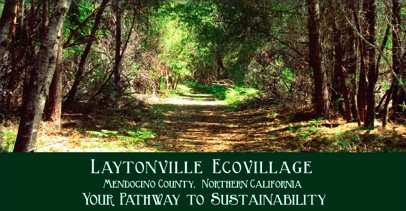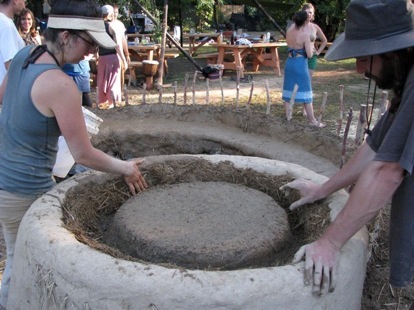








Home | About Us | Contact Us | Store

2008, Living Mandala
creative services by: 360 Degrees
Including
NATURAL BUILDING METHODOLOGIES
HANDS-ON ACTION LEARNING
COB OVEN & BENCH BUILDING
COMMUNITY BUILDING ACTIVITIES
CAMPFIRES & MUSIC
In Association With
Facilitators & Instructors
Sage Mata
Jay Ma
Dan Antonioli
Course Inspiration
For thousands of years, people from many different cultures all over the world have been living in earthen homes. The modern homes in the western world today are built with many toxic ingredients and unsustainable building practices. Most modern homes have a high impact on the environment through their embodied energy costs, carbon emissions, energy use, and inefficient designs. Natural building techniques place the highest value on sustainability, use natural & renewable resources rather than manufactured materials, lessen the environmental impacts, and create comfortable, healthy, aesthetically pleasing, and spiritually uplifting structures for people and the planet. Come learn one of the oldest natural building techniques of cob over this weekend of community building at the Laytonville Ecovillage!
Course Description
During this workshop participants will learn in their bodies the art of cob building as we design, build, and co-create a cob oven and bench. The workshops will also include an introduction and overview of natural building at large and various techniques and technologies including light straw clay, straw bale, waddle ‘n dob, natural plasters, passive solar design, and more... though the primary focus will be on cob. The workshop will include hands-on experience, so come prepared to get muddy! This weekend workshop will also be held in the fun, community building environment of the Laytonville Ecovillage to include yummy meals, campfires, music, and other community building activities.
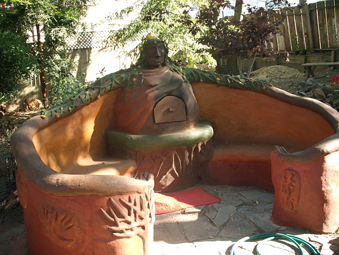
What is Natural Building?
Natural building places the highest value on sustainability, and is beyond even the most progressive and emerging “green building” techniques or defined standards. It is a general term that refers to building that primarily uses natural rather than manufactured materials. To be more sustainable, natural building uses abundantly available, renewable, reused or recycled materials. The objective is to build with simple techniques that don't further pollute the environment, consume fossil fuels, or unnecessarily extract the resources of Mother Earth. Such techniques, by their very nature, have an aesthetic value that tends to blend in with the environment, and feel natural and organic. The need to lessen the environmental impacts of housing and other buildings while promoting comfortable, healthy, aesthetically pleasing and spiritually uplifting structures is the basis of natural building.
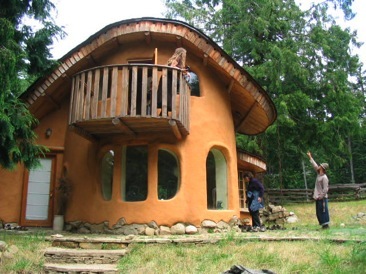
What is Cob?
Cob is a building material composed of clay, sand, and straw. The word cob comes from an old English root meaning a lump or rounded mass. Cob is traditionally made mixing or dancing the ingredients together with hands and feet - an enjoyable sensory and aesthetic experience similar to sculpting with clay. Cob is easy to learn and inexpensive to build. Additionally, it's non-toxic, creates no waste, and requires minimal tools to construct. Because there are no forms, ramming, cement or rectilinear bricks, cob lends itself to organic shapes: curved walls, arches and niches. Earth homes are cool in summer, warm in winter. Cob's resistance to rain and cold makes it ideally suited to cold climates like the Pacific Northwest, and to desert conditions.
Cob has been used for millennia even in the harsh climates of coastal Britain, at the latitude of the Aleutians. Thousands of comfortable and picturesque cob homes in England have been continuously occupied for many centuries and now command very high market values. With recent rises in the price of lumber and increasing interest in natural and environmentally safe building practices, cob is enjoying a renaissance. This ancient technology doesn't contribute to deforestation, pollution or mining nor depend on manufactured materials or power tools. Earth is non-toxic and completely recyclable. In this age of environmental degradation, dwindling natural resources, and chemical toxins hidden in our homes, doesn't it make sense to return to nature's most abundant, cheap and healthy building material?
Ecovillage Cob Oven Weekend Workshop
at the Laytonville Ecovillage
October 8-10, 2010
Mendocino County, Northern California
at the newly forming Laytonville Ecovillage
Tuition & Registration
Course Tuition is $125 - $175 U.S. dollars sliding scale, which includes meals.
Lodging & Food
Tuition includes meals from Saturday to Sunday afternoon (Friday evening is an optional potluck), with basic camping accommodations, community kitchen with grey water, hot showers, composting toilets, campfire circle, community spaces, and internet access.
Site Details

Laytonville Eco-Village
The workshop is being held on the Lay an emerging Eco-Village development project on a ten acre, beautifully forested property about a mile outside of Laytonville, California. Laytonville is a small, rural town in Northern Mendocino County located right off Highway 101, about a three-hour drive from San Francisco. The property is zoned for subdividing and is in the process of being subdivided into five two-acre parcels that together will consist of the EcoVillage. Existing infrastructure on-site includes a two-story, two-unit farmhouse that’s about 65 years old, a barn with loft, a carport, and storage buildings.
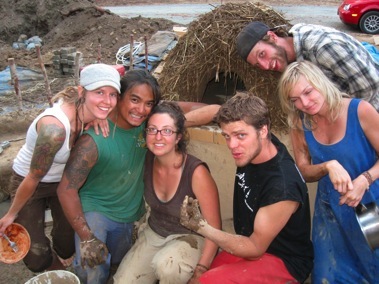
Laytonville Eco-Village Vision
The vision of the Ecovillage is to develop the land and homes with community and sustainability as the core values. All of the models of ecological design, permaculture, green building, etc. will be applied to the fullest extent possible. Lots are available to people who agree to a common vision, to community, and to working with a set of guidelines that are developed by the community. Individual lots will thus fit into a “commons” wherein they co-create and agree to a set of sustainable and community parameters.
Some of the sustainable lifestyle features we envision include microgrid, biodiesel, an electric car co-op, sauna/hot tub bath house, locally harvested materials, rainwater catchment, graywater, permaculture landscaping, etc. For more information on the Laytonville Ecovillage visit the website or contact Dan Antonioli at dantonioli@earthlink.net.
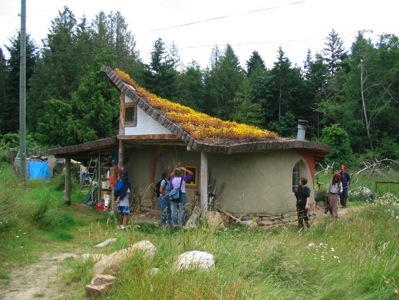
Contact
For questions and more information regarding the workshop
e-mail: education@livingmandala.com or
call: (707) 634-1461


Instructors & Facilitators
Saga Mata
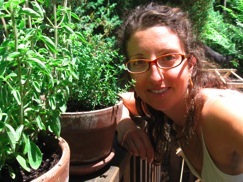
Sage has led natural building projects in Vancouver Island and various projects in CA – with her newest passion in building cob ovens! She worked as a natural building site leader at O.U.R Ecovillage (www.ourecovillage.org) and co-manager of the bountiful gardens at GingerHill farm/retreat center on the Big Island of Hawai’i (www.gingerhillfarm.com). Sage has worked for several organizations, such as the Homeless Garden Project (www.homelessgardenproject.org) and the Garden Path Project of Berkeley Youth Alternatives (www.byaonline.org/heat). Sage is also passionate about our inner ecology and about relationships in our communities – and is a practitioner and and facilitator of Compassionate Communication, World Cafes, Kriya Yoga, and Holistic Nutrition. Sage is a Programs Facilitator for Living Mandala and has been organizing, facilitating and teaching Permaculture design courses, natural building workshops, and food forest gardening workshops since 2004. Sage also currently does regenerative landscape and natural building consulting in Sonoma County, CA.
Jay Ma
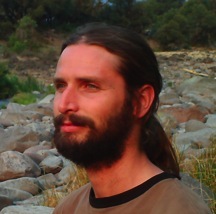
Dan Antonioli
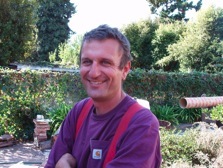
Founder of the 611 Ecovillage, an inner city Oakland urban ecovillage, he’s now spearheading the formation of the Laytonville Ecovillage. Dan has lived on permaculture sites and is excited to fulfill a dream of bringing permaculture into an ecovillage, from the ground up!
Affiliate Organizations & Sponsors
Become a sponsor of this course!
For details email: affiliates@livingmandala.com

